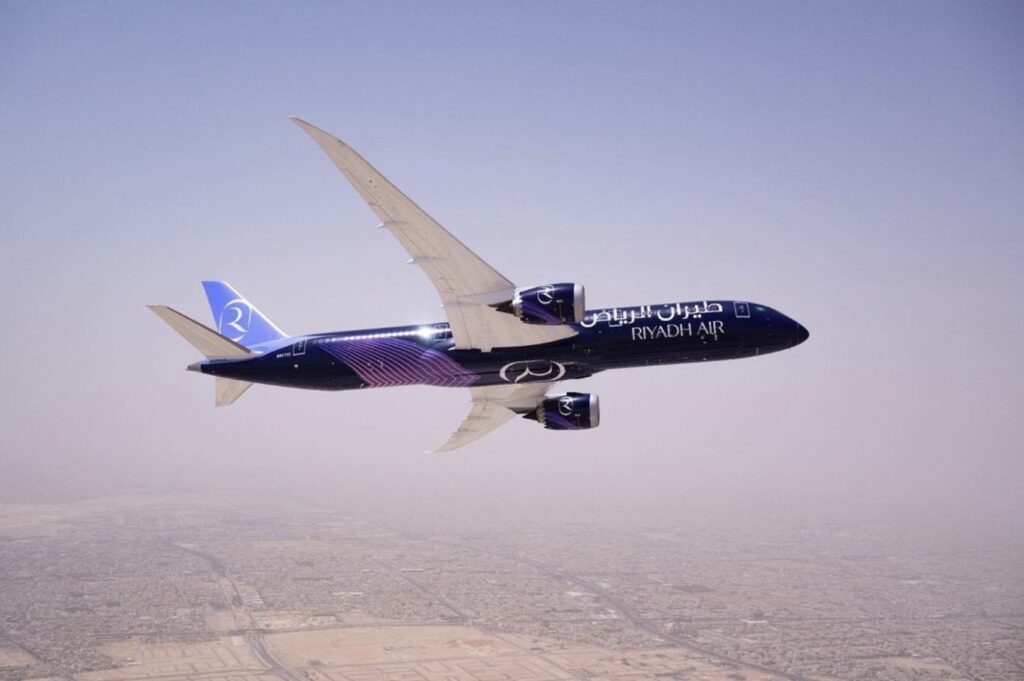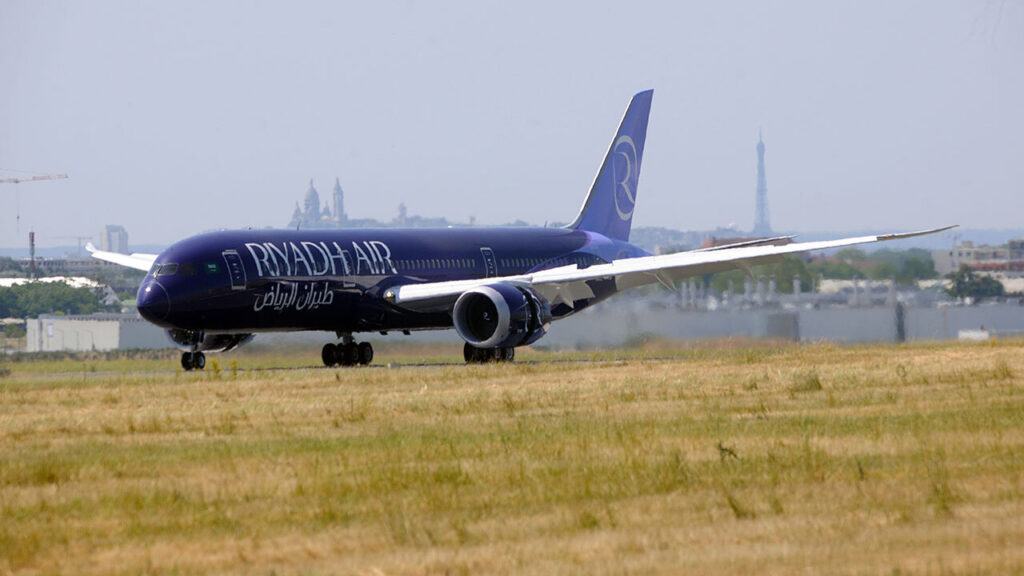Riyadh Air aims to become the “world’s first truly digital airline”
Share
At the 2023 Paris Air Show, APEX Media spoke with Riyadh Air CEO Tony Douglas and Vice President of Guest Experience, Anton Vidgen (who is also President of the APEX Board of Directors) about the new airline’s digital first strategy.
Riyadh Air, the new Saudi Arabian airline set to begin commercial flights in 2025, is already making waves in the aviation industry, with a mission to connect the Saudi capital Riyadh with 100 destinations by 2030. The airline has also started running teaser ads on social media, including YouTube and Instagram.

According to CEO Tony Douglas, even though the airline is still two years from launch, this is deliberate as the idea is to start generating excitement now. “Obviously we’re a start-up, we have a super exciting opportunity to tell a story about what this brand is all about and what people should expect for it over time.”
The other reason however is to solidify the airline’s position as being digital first:
“We’re doing it through digital channels in particular because we have no legacy. We’re going to present ourselves as the world’s first truly digital airline.”
During the Paris Air Show, Riyadh Air unveiled its striking purple livery. Douglas described it as “the kind of thing you’d expect to see on the front of Vogue. It’s stunning, it’s very stylish.”

However, this is just the first of two livery designs, with the second to be revealed later this year, as part of a “tease and reveal” strategy. The airline plans to engage with its audience through social media, building anticipation and curiosity as milestones are reached.
Tony Douglas said that ‘tease and reveal’ also builds curiousity and anticipation about the passenger experience. “Now we’ve obviously got people saying, ‘just a minute! If you’ve done something so spectacular on the outside, what have you done on the inside?”
Delivering more than just incremental service improvements
Even though it’s still too early for there to be specific details about the on-board product, Riyadh Air has already said that it will have economy, premium economy and business class cabins but no first class.
Vice President of Guest Experience, Anton Vidgen gave two reasons for that. First of all, “the premium end of the market has developed rapidly over the past few years and the gulf between business class and first class has shrunk to a mininal level.” Secondly, Vidgen pointed out that there is a substantial private jet market in Saudi Arabia now serving passengers who may previously have booked first class.
However, Riyadh Air is definitely taking a premium positioning, “we are positioning ourselves as a premium super premium airline that is going to be best in class,” said Vidgen,”which means that our business class will be absolutely at the top range. Same with our premium economy product, the same with our economy product.”
Vidgen also said that they are going to think about passenger service improvements differently:
“We cannot think of this as an incrementalist arms race of we’re going to offer slightly better food, slightly comfier duvets.”
Instead, “I think we have a unique opportunity out there to take a fresh look and a fresh approach to what guests are actually looking for. And one of the ways that we’e going to look at that is technology.”
According to Vidgen, being a startup gives Riyadh Air an advantage. “The challenge that a lot of legacy carriers have is that they have legacy technology that is often siloed, which means your airport experience can’t talk to your lounge, can’t talk to your on board, can’t talk to your pre book, can’t talk to your destination that results in a fairly disjointed experience.”
On-board sustainability and APEX Greener
In his previous role as CEO of Etihad, Tony Douglas established a reputation of being forward thinking on sustainability issues and that ethos has been brought to Riyadh Air. At an event ahead of the Paris Air Show, Douglas said that “It will be commercial aviation sustainability that will differentiate the winners and the losers, and anybody who doesn’t take it seriously will probably fail.”
Anton Vidgen said that this will be reflected in the cabin, through “waste minimisation,” and there are “many different dimensions for that. How do you have more accurate inventory forecasting so that you do not need to board as many items, whether food, beverage amenities, any of those items?
“How do we have better forecasting to make sure there is a match to those that want it and those that don’t? Second, we are trying to look at different ways of structuring our operations so that we look at recycling opportunities on board or some wonderful new galley technology that is encouraging the use of recycling.”
In addition to his role at Riyadh Air, Vidgen is also President of the APEX Board of Directors.
As part of this, he highlighted the benefits that the new APEX Greener powered by SimpliFlying database of sustainable suppliers will bring to an airline like Riyadh Air:
“This is very much an industry initiative to encourage and promote these incredible suppliers out there that are taking a sustainable approach to their offering. To me, that’s really exciting because I would like to use that at my own airline, and I would like other airlines to use that as well.”
All images via Riyadh Air


